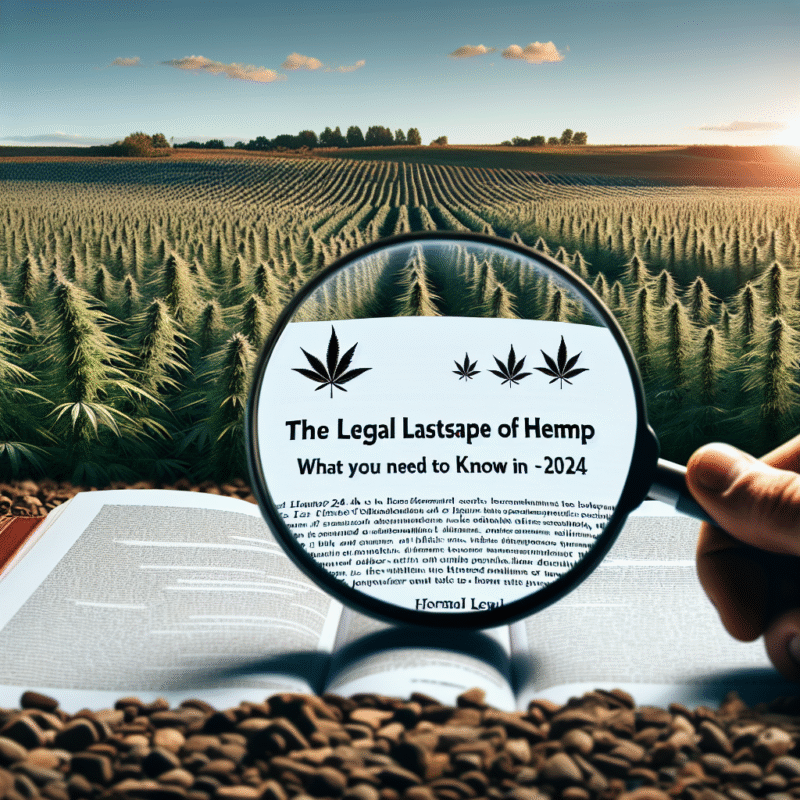The Legal Landscape of Hemp: What You Need to Know in 2024
As the hemp industry continues to evolve, understanding the legal framework surrounding it has never been more critical. In 2024, the landscape of hemp legislation is shaped by a combination of federal regulations, state laws, and international guidelines. This article explores the current legal status of hemp, key regulations to consider, and future implications for businesses and consumers alike.
The Current Federal Landscape
The 2018 Farm Bill was a landmark piece of legislation that effectively legalized hemp at the federal level, differentiating it from its psychoactive cousin, marijuana. Under this bill, hemp is defined as Cannabis sativa L. with a delta-9-tetrahydrocannabinol (THC) concentration of no more than 0.3% on a dry weight basis. This legalization has spurred significant interest and investment in the hemp industry.
However, federal regulation of hemp is still a complex area. The U.S. Department of Agriculture (USDA) and the Drug Enforcement Administration (DEA) oversee different aspects of hemp production, including:
- Licensing: Farmers must obtain licenses to grow hemp, which vary by state.
- Testing: Hemp products must be tested for THC levels to ensure compliance with federal standards.
Updates in 2024
As of 2024, the USDA has issued additional guidelines regarding the cultivation, processing, and distribution of hemp. One notable update is the increased emphasis on traceability from seed to sale. Farmers and producers are advised to maintain comprehensive records and comply with state-specific regulations, as individual states may have stricter laws than federal standards.
State Regulations
While federal law sets a baseline for hemp legality, states have the authority to enact regulations that can be more restrictive. This means that understanding local laws is crucial for anyone involved in the hemp industry.
Key State Considerations
-
Licenses and Permits: Each state has its licensing requirements. Some states may require additional permits for processing or selling hemp products, while others may have a more streamlined process.
-
Testing Requirements: States may mandate more frequent or comprehensive testing for THC and other cannabinoids, affecting product availability and compliance.
- Product Restrictions: Certain states may have restrictions on the types of hemp products that can be sold, including limitations on CBD products derived from hemp.
Consumer Safety
As the hemp market grows, consumer safety remains a priority. In 2024, the FDA has yet to establish a comprehensive regulatory framework for CBD products derived from hemp. This lack of clarity has led to a patchwork of state-level regulations aimed at ensuring safety but has also created confusion for consumers and businesses alike.
Key FDA Developments
The FDA has been focusing on safety assessments and labeling guidelines for hemp-derived products. In late 2023, the agency announced plans to expedite its review process for new products but maintained that all hemp-derived ingredients, including CBD, must comply with the Federal Food, Drug, and Cosmetic Act. Businesses must be vigilant about labeling and marketing their products to avoid misrepresentation.
The Future of Hemp Legislation
Looking ahead, the trajectory of hemp legislation appears promising but will depend on several factors, including:
-
Federal Guidelines: Continued clarity from federal agencies on the regulation of hemp-derived products will shape the industry’s growth.
-
State Innovations: Innovative state policies that promote hemp cultivation, sustainability, and production will likely serve as models for federal legislation in the future.
-
Consumer Demand: As consumers become more educated about hemp and its benefits, demand will push businesses and lawmakers to adapt.
- International Trade: The hemp industry is increasingly global. Understanding international trade policies concerning hemp can open new markets for businesses.
Conclusion
The legal landscape of hemp in 2024 is characterized by a dynamic interplay between federal regulations, state laws, consumer safety concerns, and industry growth. For farmers, processors, and consumers alike, staying informed and compliant is essential. As legislation continues to evolve, proactive engagement with regulatory changes will be critical for success in this burgeoning market. Whether you’re contemplating entering the industry or are already a player, knowledge and agility will be your most valuable assets in navigating the legal complexities surrounding hemp.

